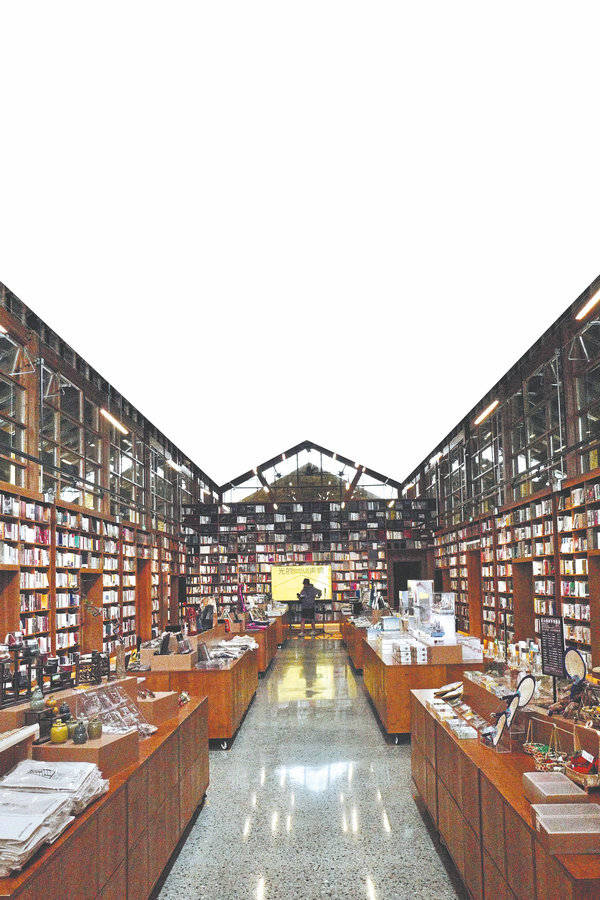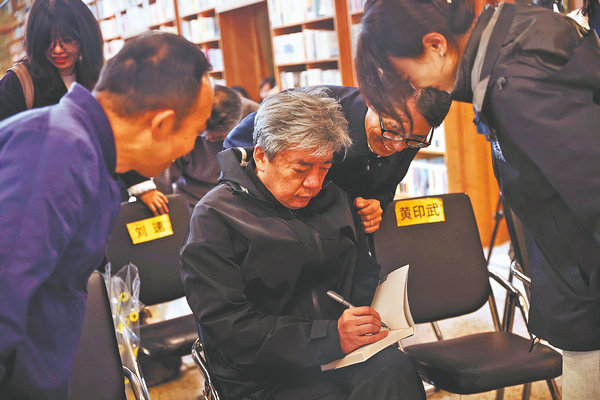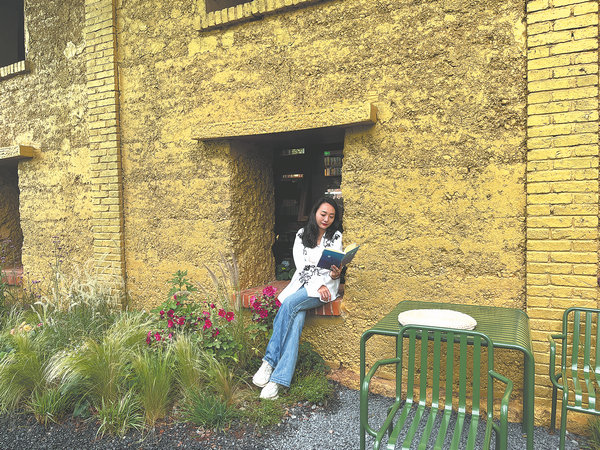
Architect Liu Jiakun transforms an old granary in Baiwu village into a visually appealing modern bookstore through the imaginative use of a type of strengthened bamboo composite. [Photo provided to China Daily]
The day before Huize Rural Bookstore of Librairie Avant-Garde in Baiwu village of Nagu town opened in late May, Zhang Ruifeng received a text message that two of three balloons disappeared from the field where they were installed.
Located in Huize county, Qujing in Yunnan province, the bookstore is a new branch of the Nanjing-based bookstore chain, Librairie Avant-Garde, in Jiangsu province. Zhang is its rotating president.
The three balloons were part of the Librairie Avant-Garde Poetry Festival, which Chen Qinshaofu and his team attached poem posters to throughout the village.
"Baiwu (white fog) is a poetic name. Poetry is a signature section in the bookstore, so we thought, 'why not organize a poetry festival in the village'," Zhang says.
Growing up in a village in Northeast China's Jilin province, Chen, 32, runs a poetry-themed shop in Kunming, Yunnan. When he first arrived in the village, he recalled his early days in the countryside.
"When I walked around the village, several poetic details emerged in my mind," he says.
"I love German poet Jan Wagner. His poem Nail would look great on a door or wall. Welsh R.S. Thomas' poems about village life and Seamus Heaney's works, like Digging, The Pitchfork and The Forge, also fit perfectly in a village setting," he says.

The 2025 Pritzker Architecture Prize laureate Liu Jiakun signs a book after the opening ceremony of the Huize Rural Bookstore of Librairie Avant-Garde in Baiwu village, Yunnan province. [Photo provided to China Daily]
"Great poems are deeply rooted in concrete things. When placed within a village setting, they don't feel jarring at all — instead, they seamlessly integrate with the environment," he says.
Chen's team transformed the Baiwu village into an exhibition space, with more than 100 poems by domestic and international poets posted in the streets, alleys and fields, on walls, doors and windows.
While strolling around the village, one would see The Forge on Forge Street, and Robert Frost's The Wood-Pile hiding beside a woodpile. Hanging in a tidy courtyard, one would read Jorge Luis Borges' Un Patio (A Patio). By a soot-darkened hearth lies Hou Ma's Snow Falls Quietly and Dinner Is Getting Ready.
Sitting at a basin on the east bank of the Jinsha River, the upper stream of the Yangtze, China's longest river, Baiwu village once served as a vital courier station along a major route for military and merchant traffic more than 2,000 years ago.
Along with copper mine development in the mid to late-Ming Dynasty (1368-1644), Baiwu became a major hub for south-to-north copper transport. A primary copper source for the country's mints during the Ming and Qing (1644-1911) dynasties, the village is hailed as "the inaugural stop on the long supply route to the capital".

A reader finds an enlightening use of a windowsill in a gold-painted wall outside the bookshop. [Photo provided to China Daily]
In 2005, Baiwu, then poverty-ridden, was designated a national historical and cultural village. Today it preserves 24 historical relics from the Ming and Qing dynasties — including guild halls, temples, bridges, wells and city walls — along with over 2,000 traditional dwellings with gray-tiled roofs and earthen walls, says He Jian, 45, who works in cultural tourism in Nagu town.
"While Baiwu village is recognized as a historical and cultural destination, its narrative centers on the traditional theme of 'copper casting and south-to-north copper transport'. However, this perspective is somewhat limiting. Through this inaugural poetry festival, we aim to weave a modern dimension into Baiwu's identity," Chen says.
This poetry festival offers visitors an experience beyond conventional historical sightseeing — they may stumble upon unexpected delights and discoveries, he says.
One can find British poet Philip Larkin's Water at the bottom of a brook running through the village, or Wagner's Nail on a door and The Pitchfork in a haystack. Observe closely and one might read Thomas' Farm Child or glimpse Kuaile De Shan (Happy Mountain) by Pumi ethnic poet Cao Wenbin.
For Chen, what matters most lies in the festival's opportunities for people to encounter poetry. "When someone reads a verse and feels an inner spark or a ripple of resonance, it matters to me," he says.

Two balloons adorned with verses for the Librairie Avant-Garde Poetry Festival. [Photo provided to China Daily]
Turning another page
The Librairie Avant-Garde Poetry Festival is a key event marking the launch of the bookshop, its sixth branch in Yunnan.
Like its predecessors, the new bookstore is located in an ancient village with breathtaking views, transformed anew from a dilapidated old building into a modern structure through redesign and reconstruction.
When Liu Jiakun, the 2025 Pritzker Architecture Prize laureate, first came to Huize county at the end of 2023, the cool temperatures, the idealism of Librairie Avant-Garde, and the local government officials' humility and passion impressed him, he says.
"Spiritual strength is a more crucial factor for a project's success than having an ideal venue or sufficient funding," he says.
After a 25-minute drive, Liu and his team stood in a yard between two derelict buildings — an old granary and a smaller pigpen-like house. "Standing in the yard, you cannot see beyond the walls. It's a very ordinary place. To build a bookstore here, the aforementioned idealism must shine," Liu says.
Rounds of investigations and discussions led to a plan to preserve the rammed-earth walls since "they belong to Baiwu village". The question was — how to see it and use it, which needed a precise decision, Liu says.
They installed a new structure made of "Wooden Bamboo" — an eco-friendly high-performance bamboo fiber-reinforced composite — inside the consolidated earthen walls.
"It might be the first time Wooden Bamboo is used to create an architectural structure, besides being used in the bookshelves and seats," he adds.
The smaller pigpen-like house was rebuilt the same way. The earthen walls were preserved and strengthened, and a new Wooden Bamboo structure was inserted to create a cafe.
However, it was not enough because "when we come here, we naturally want to look out beyond the walls," Liu says.
That is how the Poetry Garden was created. Resembling an amphitheater, the poetry garden can serve as spectator seats, where visitors can sit and watch a live music performance or book event.
Each seat is inscribed on the back with a line by a Chinese poet, such as Yu Jian, or a foreign poet like Louise Gluck from the United States. Behind each seat grow carefully selected yet rustic-looking ornamental blossoms.
Climbing up the steps reveals the bookstore's high point — a platform where, on a rainy day, visitors can look over roofs to see green rice fields under shrouds of clouds and fog enveloped by dark mountains.
The garden also helps solve a problem. Bookstores need toilets.
It is impossible to connect water pipes and build toilets in a dilapidated old house, while a stand-alone bathroom — while feasible — would reduce the space to pure utility. Combining a functional need and the spiritual urge to ascend, the poetry garden has been built, the architect explains.
However, by this stage, Liu felt something was still missing.
The locals were worried that the renovation would largely change the old houses' aesthetics, making them incompatible with the village.
"We want the bookstore to blend into the land yet also stand out with positive energy and the spirit of Librairie Avant-Garde," Liu says.
After reinforcing the outside and structure of the earthen walls, they needed to unify the aesthetics.
Huize is historically a copper mining hub. Combining this with the ancient Chinese poetry line that translates to "there is a house of gold in books", which metaphorically suggests that knowledge and wealth can be found through reading, Liu spray-painted the bookstore's outer walls gold to achieve the effect of "blending in with the land, yet standing out".
"It's risky to use the color gold. Different shades of gold indicate different ethos. We did a lot of experiments and chose a brilliant, elegant one," he says.
A sense of community
Coexisting with nature is one of Liu's principles towards architecture. Each season, new flowers will bloom in the poetry garden and yard, and some surfaces of the bookstore and cafe will be covered by climbing plants. "The houses will keep changing," says Zhang, the rotating president.
The new bookstore houses nearly 20,000 books, including poetry and books about local history and culture. A variety of cultural creative products are for sale, 60 of which are created specifically for this bookstore, including refrigerator magnets, postcards, bags and copper products.
"We are exploring what we can do for poetry. In our bookstore in Shaxi town, Dali Bai autonomous prefecture, we have a poetry tower, and in Mengzi, we have a poetry bell tower. Here, we've created a poetry garden, which is part of this bookstore and also an independent architectural structure," Zhang says about their branches in Yunnan.
Liu believes that architecture "can shape human behavior and create an atmosphere, providing a sense of tranquility and poetry, evoking empathy and kindness, and fostering a sense of community with shared joys and sorrows."
When the bookstore and the cafe close, the poetry garden stays open to the public, becoming a square where villagers gather after dinner.
"When I was here in April, I heard them chat in the local dialect and the children running around. Sometimes they read the lines on the seat backs by German-language poet Rainer Maria Rilke or British-born poet W.H. Auden, or played cards," Zhang says.
"We put our bookstores in the countryside to build a public space for villagers. Here, this goal has been achieved thanks to the ingenious design," he says.
The poem balloons were retrieved just in time after traveling in high winds for several hours.
At the opening ceremony, people from Baiwu village, other areas of Huize county and nearby cities like Kunming gathered to hear musician Mo Xizishi play the guitar and sing songs, architects Liu, Huang Yinwu and Zhao Yang discuss architecture, and poets like Yu and Han Dong read their works. A woman named Gui Lisha from Huize read a poem she had written in the local dialect.
In his speech, Zhang invited villagers to frequent the bookstore in their free time.
"In addition to promoting local economic development, we believe the bookstore, cultural events and visitors will gradually influence villagers' attitudes toward life, especially the children," he adds.
He Jian says the opening of the bookstore is a significant event for Huize county. The attention brought by a renowned brand and a famous architect who just won the world's highest architectural honor is immeasurable, he says.
He observes a noticeable rise in tourists visiting Baiwu village to take photos, read books and purchase cultural products.
"It is a pleasant surprise that many villagers have started visiting the bookstore. It can be said that its arrival has injected great vitality into Baiwu village, offering villagers a new lifestyle and bringing more possibilities to the countryside," he says.
 Editor:Qiu Xiaochen
Editor:Qiu Xiaochen